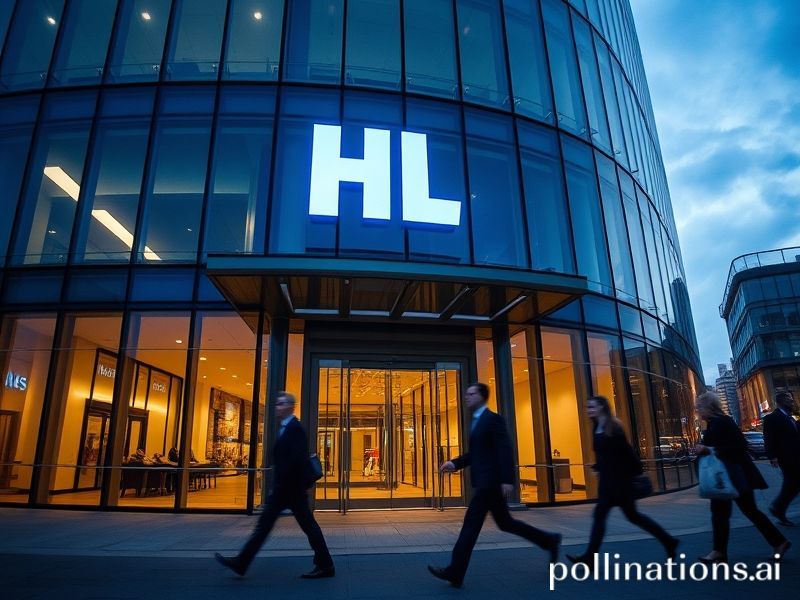How a British Butler of Finance Became the World’s Cautionary Canary: The Hargreaves Lansdown Saga
Bristol, England – In the genteel world of British fund supermarkets, where the tea is strong, the accents clipped, and the commissions once as stealthy as pickpockets at a royal wedding, Hargreaves Lansdown has long played the role of the impeccably mannered butler: discreet, indispensable, and quietly skimming the silver. Yet from Jakarta to Johannesburg, anyone with a retirement plan— or merely the misfortune of having one denominated in sterling— now watches this dowager of DIY investing as if she were the canary in the global coal mine. Spoiler: the canary has developed a cough.
Let us zoom out. While Americans were busy turning meme stocks into performance art and Koreans were bidding up kimchi futures, Hargreaves spent three decades persuading dentists and retired majors to park their nest-eggs in “steady” UK equity funds with fees so layered they resembled geological strata. The firm’s genius lay in wrapping British modesty around compound interest: “We’re not flashy, old boy, just quietly fleecing you on an annual basis.” Globally, that pitch translated into £130 billion of assets— roughly the GDP of Hungary, minus the goulash. When you command that much idle cash, even a sneeze in Bristol registers on seismic charts in Singapore.
Enter stage left: Neil Woodford, the once-crowned king of UK income investing, whose spectacular 2019 implosion turned out to be less a cautionary tale and more a piñata stuffed with litigation. Hargreaves had aggressively marketed the Woodford Equity Income fund on its best-buy list— think of it as Michelin stars for money— right up until the gates clanged shut and small investors realized their savings were now frozen like British rail points in January. Cue regulatory scoldings, parliamentary theatrics, and a compensation bill that keeps growing the way British waistlines expand post-pub. The Financial Conduct Authority’s final report, delivered with the solemnity of a funeral toast, politely called the episode “unacceptable.” Translation: we’re shocked— shocked!— that marketing incentives might distort advice.
The ripple effects have been delightfully international. Asian wealth platforms, once eager to import the Hargreaves model of slick apps plus cozy fund-manager back-scratching, suddenly discovered that reputational risk travels faster than 5G. In Dubai, private bankers who had been flogging “UK wealth expertise” to expats began hastily re-labeling brochures. Even the Swiss— who consider financial scandal a spectator sport— raised an eyebrow, the Alpine equivalent of a standing ovation.
Meanwhile, the firm’s board has embarked on a strategic review, corporate-speak for “panic quietly behind closed doors.” Activist investors, those charming locusts in Savile Row suits, circle overhead demanding cost cuts, fee transparency, and possibly a sacrificial CEO or two. The share price, once sturdy as a royal guard, has resembled a drunken Morris dancer since 2019. Clients, bless their cynical hearts, have yanked £14 billion faster than you can say “Brexit dividend,” proving that loyalty lasts exactly until the first whiff of scandal—or a cheaper ETF.
And here lies the broader significance. Hargreaves Lansdown’s saga is not merely a British farce; it is a global parable about the myth of friction-free capitalism. From robo-advisors in Silicon Valley to crypto exchanges in the Bahamas, everyone promised to “democratize finance” while quietly monetizing the democracy. When trust evaporates— whether through opaque fees, cozy gatekeeping, or plain old fraud— capital flees with the indifference of a cat abandoning a sofa. The flight path is always the same: first the money, then the reputation, then the regulators arrive like detectives at the end of a murder mystery, ready to blame the corpse.
So, dear international reader, next time your local fintech app assures you they’re “the Hargreaves Lansdown of Southeast Asia,” remember the cautionary tale unfolding in Bristol. Somewhere in the City, a mahogany-paneled boardroom is serving weak coffee and existential dread. And across continents, investors are learning anew the oldest lesson in finance: if someone promises to look after your money for only a “modest” percentage, check whether the modesty applies to the returns or the fleece.







